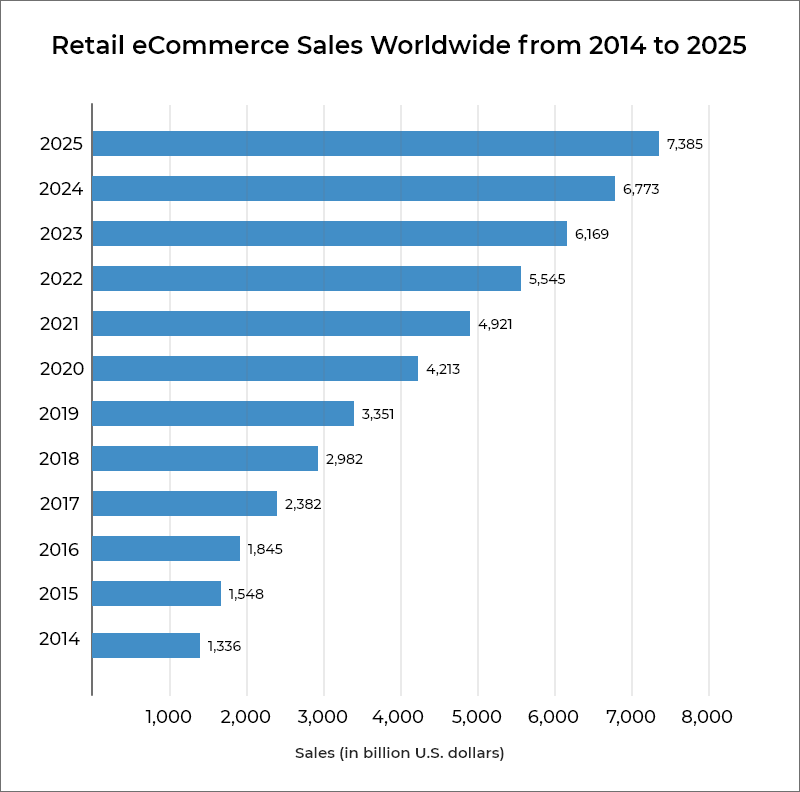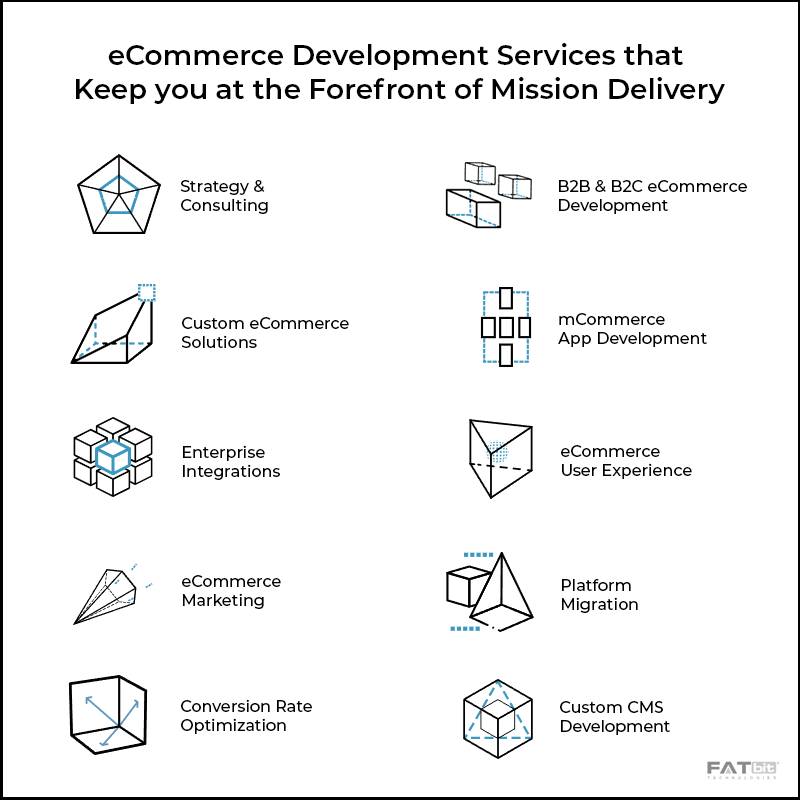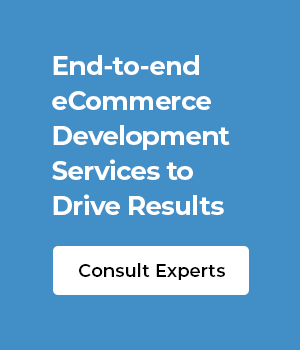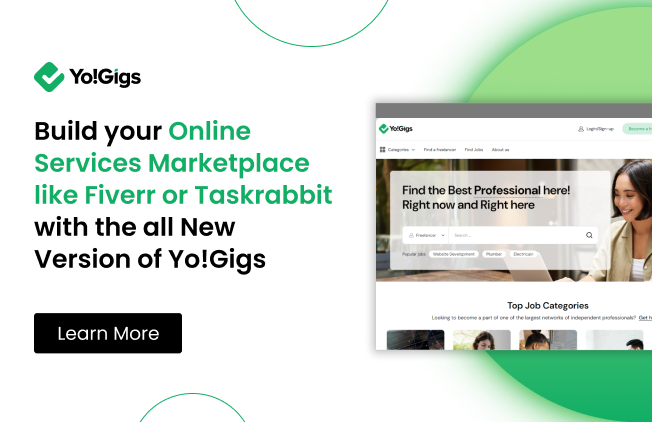eCommerce is on the rise. The whole ecosystem continues to flourish and evolve to provide startups and existing businesses with multiple opportunities – to meet their consumers on a purpose-developed platform.
A survey conducted by BCG revealed that amongst all ecommerce organizations in North America and the UK, 88% grew in 2020. Moreover, 94% expressed that they will expand further in 2021-22.
Market leaders such as Amazon, Airbnb, Alibaba, and others have played a part in establishing the ecommerce ecosystem. According to Optinmaster, 93.5% of internet users globally have purchased products online. Consumers are increasingly getting familiar with online shopping, and are willing to explore further. They are also getting habituated with the online shopping experience vis-a-vis these popular ecommerce websites.
This opens up opportunities for startups and existing businesses without an online channel. They can analyze the market and offer a customer-specific online shopping experience in line with the identified business strategy, by availing ecommerce development services. Also, businesses with an existing online channel can purpose-develop their platforms to drive better results.
In this blog, read how success in the ecommerce space can be achieved with ecommerce development services.
Table Of Contents
Importance of an eCommerce Website in 2022 and Beyond
According to Statista, global retail ecommerce sales amounted to an estimated $4.9 trillion in 2021. This sales figure is predicted to grow by a healthy 50 percent over the next four years. Thus, ecommerce sales may swell to about 7.4 trillion dollars by 2025.

Source: Statista
The pandemic has demonstrated the value of an ecommerce strategy to businesses. In the post-crisis world, an offline-only sales channel runs the risk for organizations to be running on empty. They will be at a disadvantage against competitors who have made the shift.
The ongoing shift in consumer behavior has meant they are more likely to meet businesses on the online platform, than offline 一 emphasizing the significance of an ecommerce channel.
For these reasons, startups have lucrative business options in the ecommerce space. A deeper understanding of some viable ecommerce marketplace ideas can aid in formulating business strategies around an ecommerce business that has growth potential.
Businesses with an existing online presence can fuel further growth by a focus to analyze and improve their platform.
But whether startups or existing businesses, the value provided to the end customer underpins the success of the business. Popular ecommerce businesses like Amazon, Etsy, Airbnb, Turo, Alibaba, and others have scripted their success story with a unique value proposition that forms the core of the business and catalyzes growth drivers.
Let’s understand how that can be achieved for your business.
Role of Custom eCommerce Development Services in Giving an eCommerce Advantage
“Almost every disruption starts at the perceived fringes of today’s market” – Scott D Anthony
Every business is different. Their business process underpinnings, market positioning & strategy, and end-customer needs differ. The ecommerce website connects all objectives and processes for the business.
To meet varying needs 一 the ecommerce website needs customization.
Simply put, custom ecommerce development services would help in tailoring the website based on the identified set of requirements. This is discussed in more detail below.
Importance of Custom eCommerce Development Services:
Custom ecommerce development services can provide an advantage in the following areas:
Market Positioning of the eCommerce Platform
The ecommerce space is flourishing, and it witnesses new startups launch their platforms to cash in on the opportunity.
To be competitive in such a space, businesses need to be at the top of their game to gain consumer interest.
The ecommerce website features, performance, user experience, and other factors need to be considered to define the USPs of the business and lay the groundwork for success. Custom ecommerce development companies can tailor the ecommerce platform to serve this purpose.
eCommerce – Complex Underpinnings
eCommerce websites have more complexities involved than other websites. There are a host of functionalities needed, and at the same time, the website needs to perform well for the end-users.
The website hosts customer interactions and facilitates business operations at the same time. Customization services allow seamless operability of the ecommerce platform.
Ease of Business Operations
eCommerce can digitize operations for businesses 一 adding automation, integrations, and other customizations to the ecommerce platform can streamline operations for the business 一 both within and outside of the organization.
Personalization – Focus on the Customer
The more an ecommerce marketplace is able to reach out to its customers with a platform that is able to solve a problem in a way the competitors can not 一 the higher is its chances of succeeding.
Moreover, tailored marketing schemes, loyalty benefits, an emphasis on improving performance, enhancing security, and other such custom ecommerce functionalities can improve the buying experience for the customers.
Get Traction on your eCommerce Platform with Customer-centric Features
After-sales Support 一 Long Term Advantages
Custom ecommerce service companies can offer after-sales support along with the services. This can help businesses avail support from companies that have worked on the platform and understand its underpinnings for future enhancements.
Moreover, ecommerce development companies can also help with additional services that can help in faster adoption within organizations and more effective business planning.
Varying Business Requirements Through eCommerce Lifecycle
The considerations for a business will differ throughout the ecommerce lifecycle and so will the requirements. Let’s understand in detail with pointers discussed below:
Launch Stage: An ecommerce business, at the launch stage, will be based on an identified consumer need 一 which basically is based on a hypothesis, formulated based on market assumptions.
Key consideration at this stage would be a quick launch 一 with an essentials-only platform, with the intent to scale up as and when required. Additionally, gaining early market traction is one of the topmost priorities.
Startups can also consider an ecommerce MVP first business strategy to achieve these objectives. The requirements will vary accordingly.
Consolidation Stage: Once a business has gained that early traction, and has gained a customer base 一 it reaches a consolidation phase. Considerations at this stage will be to refine the platform and iron out any identified flaws or shortcomings.
The business can also work towards reducing overheads and streamlining workflows by focusing on business processes. This stage also provides for a launchpad to the next stage.
Refocus-on-growth Stage: With a sustainable ecommerce business at hand, the owners can refocus on further growth by bringing forth relevant changes.
At this stage, the business can consider deeper market penetration, expanding business reach, introducing new features, adding additional revenue streams, and other such requirements.
Thus the requirements of the business will vary according to the stage and nature of the business.
Discussed below, are the top ecommerce development services:
Top 10 eCommerce Development Services
eCommerce development services can provide startups planning to set up an ecommerce website or existing businesses. Let us understand how these services add value and competitiveness to any ecommerce business regardless of its stage. Discussed below are the top ecommerce development services, reasons to choose them, and the benefits they bring forth.

Strategy & Consulting
Etsy, the online marketplace for handicrafts and other unique items, has come from a Brooklyn apartment in 2005 to a net worth of $17.59B as of March 2022. The P2P marketplace’s success has been built around identifying the right user needs despite existing competitors like eBay and many others over the years.
Etsy’s story underlines the value of a well-constructed ecommerce strategy.
Almost 2 decades after Etsy started out 一 in the post-pandemic world, where ecommerce has garnered attention from the business world as a preferred investment option 一 a successful ecommerce business hinges largely on a well-thought business model underpinned by all components working cohesively like a well-oiled machine to deliver value to the end-user, that convinces them to turn to your business for their needs.
Strategy and consulting services from companies with ecommerce expertise, honed with delivering results to a global clientele, in multiple niches, can provide a business with a springboard to navigate through the competition, and define their business with a robust plan.
B2B & B2C eCommerce Development
Customer-focused ecommerce platforms put buyers’ needs into perspective and offer features accordingly. And these needs will vary if the end-users are customers or businesses. Correspondingly, in B2B or B2C, the business conducted on the platform determines the requisite features on the ecommerce platform. Although B2C platforms have evolved expeditiously over the years, B2B ecommerce too has gained traction in recent times.
Traditionally, B2B ecommerce has laid emphasis on in-person interactions. But that is changing, the shift online brings forth benefits to potentially transform the way business has been conducted in the B2B space.
Moreover, decision-makers in the B2B space have witnessed the rise of ecommerce in the B2C space at an individual level, opening up their approach regarding opportunities in B2B eCommerce.
The result of these factors has made B2B space evolve to offer functionalities that facilitate commerce between businesses while offering buying experiences similar to B2C ecommerce websites.
There might be similarities between B2B and B2C, but fundamentally they differ. Let’s delve further into how a change in the end-users impacts the underpinnings of an ecommerce business.
| Buyers in a B2B Business |
Buyers in a B2C Business |
| B2B purchases are analysis-driven, with a focus on long-term product value. Decision drivers are a mix of complex parameters. Some of the primary concerns are product ROI, the value it brings to the business, and the way it can benefit the brand image of the business. |
B2C purchases may be emotion-driven, impacted by peers. The primary decision drivers are the way product is marketed, with features it offers, the brand value associated with it, and the value it adds. |
| Purchase is often of high value with larger quantities. Allied services may be required. |
Comparatively, most purchases are often of lower value with lesser quantities. |
| Communication with the sellers and buyers is an important factor as B2B prioritizes business relations. Product pricing may be subjective and may change per business deal with scope for further negotiation. Further, client interaction can be across multiple channels, with longer sales cycles. |
The primary consideration in B2C is the product itself and the value for money proposition it presents. Product prices don’t typically change for different buyers. The sales cycle is typically short and may be limited to a single purchase. |
By evaluating the differences mentioned above, it can be understood that the features required in a B2B ecommerce website will vary in comparison to a B2C ecommerce website. A B2B ecommerce marketplace will need features to facilitate commerce between businesses.
So, with B2B ecommerce development, the marketplace can have features like an RFQ module, bulk discounts, minimum order quantities, and more to drive better results. These features, on the other hand, might not be of any value in a typical B2C marketplace.
Customize your B2B eCommerce Marketplace to Facilitate Seamless Business Transactions
Custom eCommerce Solutions
Custom ecommerce solutions can let businesses customize their website to provide user-centric functionalities, achieve higher operational efficiencies, or include tools to enhance business reach for the online venture.
Startups can avail of these solutions to propel their business with a unique value proposition. Existing businesses can enhance the appeal of their ecommerce platform.
eCommerce success hinges on building the website around the customer’s needs. Relevant, domain-specific features foster customer engagement by providing requisite functionalities.
Features that ease business operations 一 catalyze ecommerce growth by streamlining the workflow. For instance, automated inventory management, automated billing, and shipping management 一 streamline business processes.
Analytics, marketing & SEO tools, further provide the business to tailor the marketing strategy to meet planned business goals.
eCommerce functionalities mentioned above, are achieved by availing ecommerce customization services. While some of these features are achieved with integrations with APIs provided by third-party service providers. Others require enhancement of the platform. These integrations are part of backend customizations.
Front-end customizations, on the other hand, will personalize the look and feel of the ecommerce website, in line with the branding requirements.
For existing ecommerce website owners, customization services can provide desired results, but startups have another viable alternative.
The above-stated considerations can make developing an ecommerce website from the ground up time-consuming. Given ecommerce complexities, getting the platform to perform seamlessly, requires robust development practices and rigorous testing. Using customizable turnkey ecommerce solutions can shorten custom ecommerce development.
Using Customizable Turnkey eCommerce Solutions to Develop a Result-driven Website:
Turnkey ecommerce solutions like FATbit products, Shopify, Magento, and others can let businesses launch an ecommerce website using fewer resources and time when compared to developing the website from scratch.
Moreover, these industry-leading ecommerce marketplace solutions are developed after analyzing core business practices of popular market players of the ecommerce industry like Amazon, Alibaba, Turo, and others. For startups, this can be crucial, as the effort that is to be invested in analyzing product-market fit, with the right feature set, can be saved with these turnkey solutions that come with out-of-the-box features.
Get Self-hosted eCommerce Solutions Extending over a Range of Industry Niches
mCommerce App Development
According to Statista, the retail M-commerce sales in the US were in excess of 360 billion U.S. dollars in 2021. By 2025, it is predicted that the figure will grow almost twofold, amounting to 710 billion U.S. dollars.
The shift to mobiles as a preferred device is on expected lines, given the convenience offered by them.
Moreover, the evolution of mobile apps to deliver superior experiences over the years has propelled their traction in the ecommerce space.
For businesses, the more it meets customers in the preferred mode of shopping, the greater leverage it gives its brand. Additionally, m-commerce can increase conversions by involving consumers who prioritize mobile devices.
Mobile apps can be beneficial to any ecommerce business. But those focused on providing services based on split-second decisions or the convenience of purchasing on the go 一 can consider investing in availing mobile apps. For instance, Taxi-booking, online meal ordering, and other similar ecommerce businesses rely heavily on the availability of mobile apps.
Enterprise Integrations
One of the primary growth drivers propelling your ecommerce success is streamlined internal operations within the organization.
This can be achieved by centralizing operations, connecting teams, fostering collaborations internally, and allowing measurable performance to power mechanisms. Further, automation drives efficiency, connecting data sources with business processes 一 powering business strategies to achieve the objectives.
API-driven enterprise integrations with ecommerce operations can centralize operations to achieve these outcomes. Enterprise Resource Planning (ERP) software or Customer relationship Management (CRM) software can be integrated with the ecommerce platform, to streamline workflows.
Moreover, legacy software, used to manage operations within an organization, can be integrated with the ecommerce platform. Apart from seamless workflows, this can further provide analytical tools to the key decision-makers within the organization. The ecosystem can become connected, data-driven, and simplified to maximize ecommerce performance.
eCommerce User Experience
“If there’s one reason we have done better than our peers in the Internet space over the last six years, it is because we have focused like a laser on customer experience.” – Jeff Bezos, founder of Amazon
Market leaders in the ecommerce space have built their success by understanding the complete buyer journey. They streamline the UX provided by their platform to encourage conversions throughout the customer touchpoints.
Likewise, winning in ecommerce entails building the website around the customer’s needs. The idea is to remove any friction to offer a seamless user experience. A better user experience can drive user engagement, leading to higher conversions.
Existing online businesses can consider availing these services to increase conversions on their platform. Moreover, websites offering better buying experiences also stand-out 一 augmenting the brand image.
eCommerce Marketing
One of the biggest advantages of a digital product is the audience that it can help reach. A good marketing strategy can help amplify brand presence, increase buyer footfall, and eventually drive higher revenue for the online business.
Marketing the online business generally follows a two-pronged strategy. Acquiring new customers catalyzes growth while a focus on retaining customers fosters business continuity. The marketing plan strives to achieve a balance between customer acquisition and customer retention.
The opportunities to achieve the desired objectives are endless.
New audiences can be reached with marketing activities like SEO marketing, content marketing, social media marketing, email newsletters, and others. Affiliate marketing schemes can further help bring traffic to the website.
The ecommerce website can focus on buyer-focused features that help to upsell and cross-sell products. Discount and referral schemes help catalyze conversions.
Analytical and marketing tools within the website help gauge the performance of the marketing plan and assist in further development of the marketing strategy for the business.
Beyond website enhancements, streamlining workflows of the sales and marketing team of the organization can reap rewards with a better focus on the deliverables.
A sound marketing plan benefits both startups and existing businesses, although the requirements vary for each business.
To achieve a competitive advantage, businesses continuously look to reinvent themselves. eCommerce is no different. Once an online venture successfully passes through the launch stage and reaches sustenance levels, it can focus on reducing overheads, increasing cost-efficiency, and augmenting innovation.
Platform Migration services can allow existing ecommerce businesses to migrate from existing platforms to newer ones, in order to achieve identified objectives.
Some key reasons that can make platform migration favorable are as follows:
- SaaS-based ecommerce solutions come with recurring charges, leading to excess overheads for the business. Leading self-hosted ecommerce solutions can help in reducing these overheads, while still providing a robust platform for the online business. It is important to note that some of these solutions are license-based, available with a one-time payment.
- Feature-rich ecommerce solutions further allow enhancing the appeal of the platforms with the aforementioned benefits.
- Out-of-the-box pre-integrations in ecommerce solutions with business APIs streamline workflows.
- eCommerce solutions backed by in-house customization teams are in a better position to deliver favorable results. Customization is achieved by the development teams who best understand the underpinnings of the software.
Conversion Rate Optimization
The success of an ecommerce business will depend upon the revenue generated. Getting traffic can be good for a start, but converting it into conversions can let the business achieve its long-term goals.
A careful analysis of all customer touchpoints throughout the buyers’ journey on the website, can fructify into higher conversions on the websites.
Implement Data-driven Analysis: Analytical tools can help in setting a strategy that can bring the results. Data-driven analysis can help in identifying gray areas and bright ones.
Measure Qualitative Performance: Additionally, user analysis can be performed with tools that give insight into customer interests on the website. Heat maps, scroll maps, and other data can be used to gauge buyer interest.
Consider Website Customization: Removing friction from the buyer journey by tailoring the UI/UX of the website, assisting in providing requisite product information to generate consumer interest, adding customer-centric features like
Analyze Website Performance: In the competitive ecommerce space, slow website speed can test the patience of consumers, increasing bounce rates. The website can be optimized to deliver seamless performance.
Consider Updating the Marketing Strategy: An analysis of the current marketing strategy of the online business and ways to improve it can bring in favorable results.
eCommerce Development Services that Analyze, Implement, and Deliver Success
Custom CMS Development
A Content Management System or CMS is used to manage a website intuitively, without the need to develop the pages with coding. Although CMS can be implemented for all websites, ecommerce websites need regular content management, so CMS becomes a quintessential part of it.
A custom CMS can offer the following benefits:
- Enhanced Security: Cybersecurity is gaining in importance for ecommerce. With the evolving technological landscape, instances of cyberattacks are also on the rise. Customized CMS can be built with enhanced security to ward off these attacks.
- Performance and Speed: Modern-day ecommerce websites face stiff competition in the market. Faster, and reliable performance is key to success in the ecommerce space.
- Upgrading Legacy Systems: Digital technology has been evolving to meet the demands of the industry. Legacy systems run the risk of getting outdated with time. Custom CMS development can leverage the latest technologies and the advantage of open source frameworks to modernize legacy systems.
- Scalability: eCommerce businesses can scale expeditiously. A custom-built CMS can be developed to cater to growing business needs.
- Personalizations: For greater control over the websites, custom CMS development services can be availed. Custom-centric features, integrated after analyzing the buyer journey, can result in higher conversions. Niche-specific functionalities can help a business stand out from the competition.
To Conclude
The ecommerce industry has been a lucrative space for some time now. Especially since the pandemic-induced shift in consumer preferences. This has meant that the competition is rising in the industry as well.
Nevertheless, there is still a lot of scope for newer online ventures. According to Statista, in 2021, 19.6 percent of retail sales worldwide were through the online channel. It is predicted that by 2025, the online channel share would make up close to a quarter of total global retail sales.
New ventures can win if they can provide a solution to identified consumer needs via their business. Existing businesses can work towards gaining a competitive advantage in the market. As such, ecommerce development services hold benefits for businesses through the ecommerce lifecycle.
FATbit Technologies, a leading ecommerce development company, leverages the incremental and iterative benefits of Agile practices, along with years of domain expertise to power result-driven custom ecommerce services. From SMBs to enterprises, startups to legacy online businesses 一 the company can provide an advantage with its extensive ecommerce services.
Frequently Asked Questions – eCommerce Development Services
1. What is ecommerce development?
Ans: On a broader level, an ecommerce website facilitates the sale of products or services over an online platform. Amazon, Alibaba, Turo, Uber, DoorDash, are all examples of ecommerce websites.
eCommerce website development is building these platforms and making them work. It involves designing the UI/UX, adding requisite features and functionalities, making payments work, facilitating ecommerce business operations and more.
2. What are the top ecommerce development services?
Ans: As discussed in detail in this blog, the top ecommerce services are: turnkey ecommerce Solutions, Custom ecommerce Solutions, ecommerce User Experience, ecommerce Marketing, platform migration, M-commerce App Development, B2C & B2B ecommerce Development, enterprise integrations, custom CMS development, Conversion Rate Optimization ecommerce Strategy & Consulting.
3. How much does it cost for custom ecommerce development?
Ans: As discussed in the article above, there are multiple variables associated with an ecommerce website. The cost for custom ecommerce development varies depending upon the extent of customization services opted for.
Moreover, the approach used for development, and the charges levied by the partner company are other variables that will have a bearing on the cost of the custom services.
4. How to develop an ecommerce website?
Ans: There are two popular approaches to developing an ecommerce website:
The first would be hiring an in-house team and developing the website from scratch. This method can deliver the required results but needs a lot of time and a significant amount of resources. Moreover technical and ecommerce expertise would be needed to develop the right platform to suit the business plan.
The second and easier approach is using customizable turnkey solutions that come with requisite features out of the box and then scale up as required.




